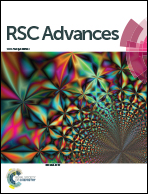Enhanced cycling stability of silicon anode by in situ polymerization of poly(aniline-co-pyrrole)
Abstract
The application of a silicon-based Li-ion battery anode is limited by the poor cycling stability associated with its large volume changes during the charging and discharging processes. Herein, we report a facile solution process to fabricate silicon composite anodes by encapsulating Si nanoparticles with in situ polymerized aniline and pyrrole copolymers. The copolymer matrix can accommodate the considerable volume changes of Si during the cycling process. Therefore, the as-prepared Si/poly(aniline-co-pyrrole) composite electrodes successfully achieve higher capacity and better cycling performance than the bare nano-Si anode. The specific capacity of the composite electrode retains 637 mA h g−1 after 50 cycles.


 Please wait while we load your content...
Please wait while we load your content...